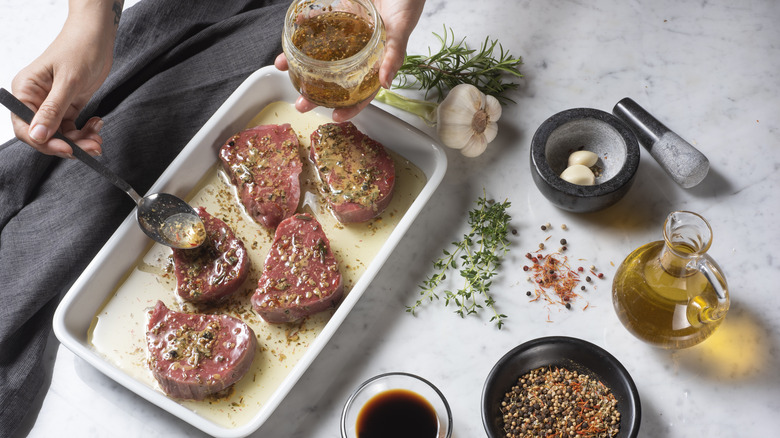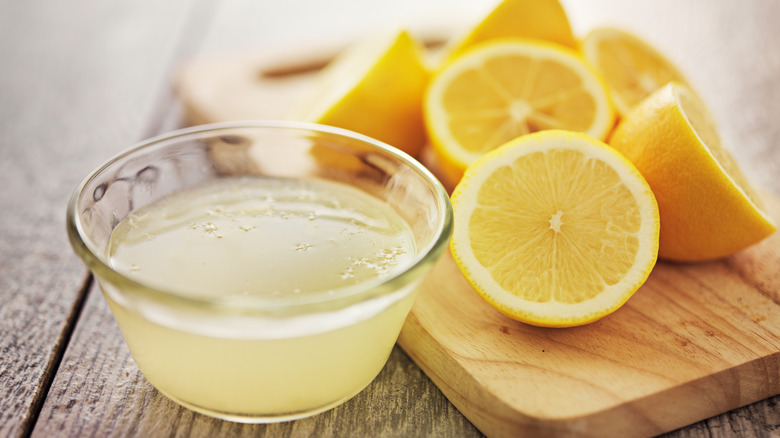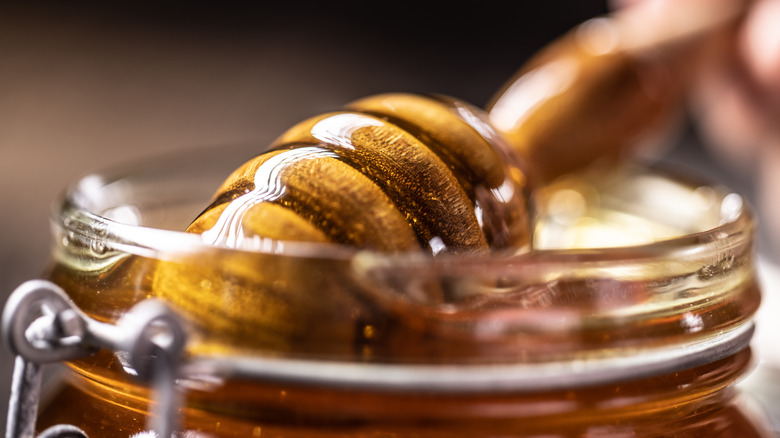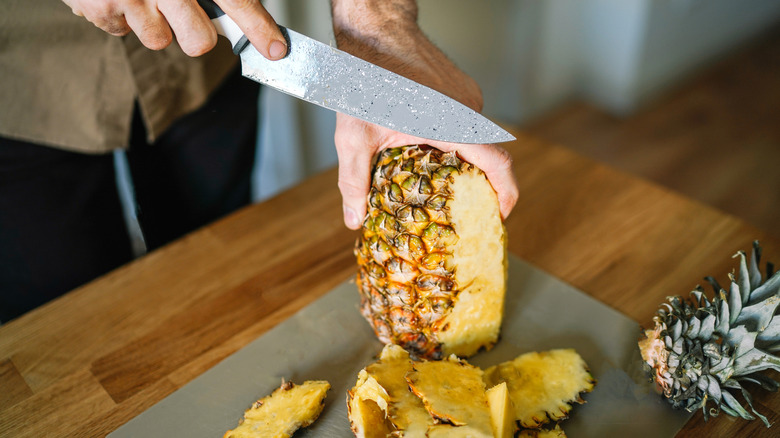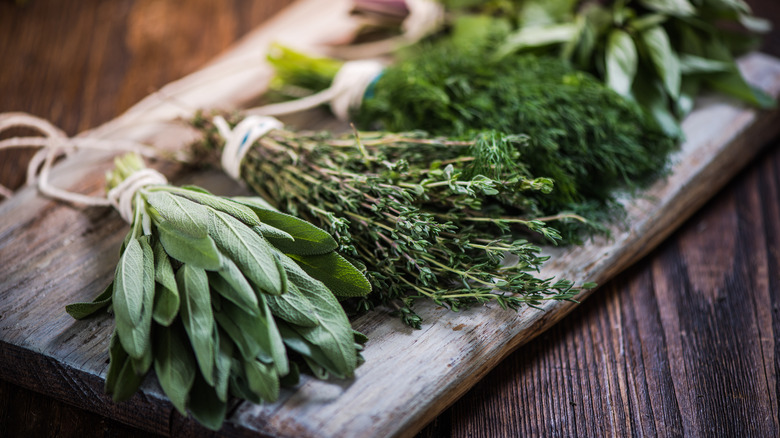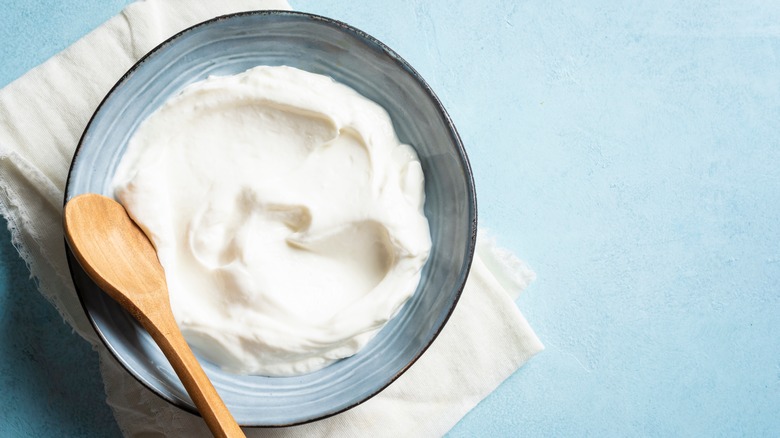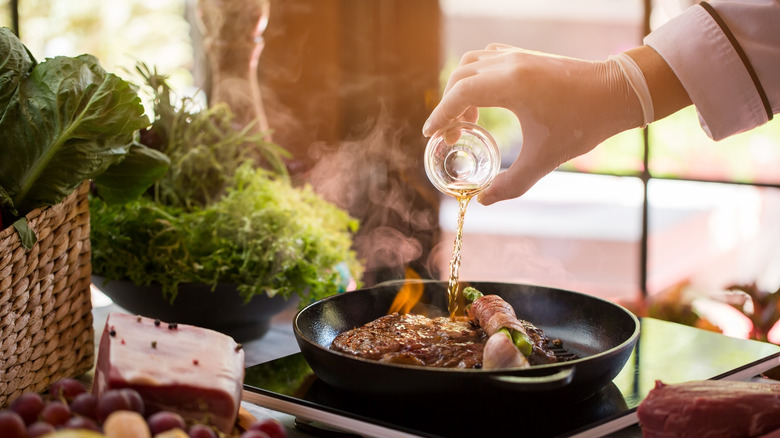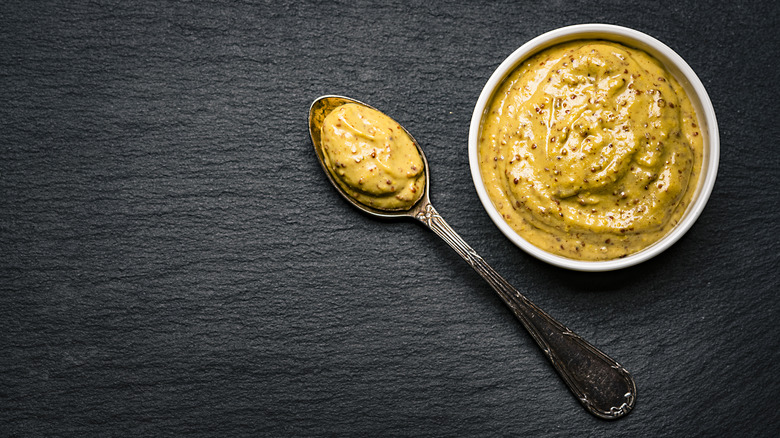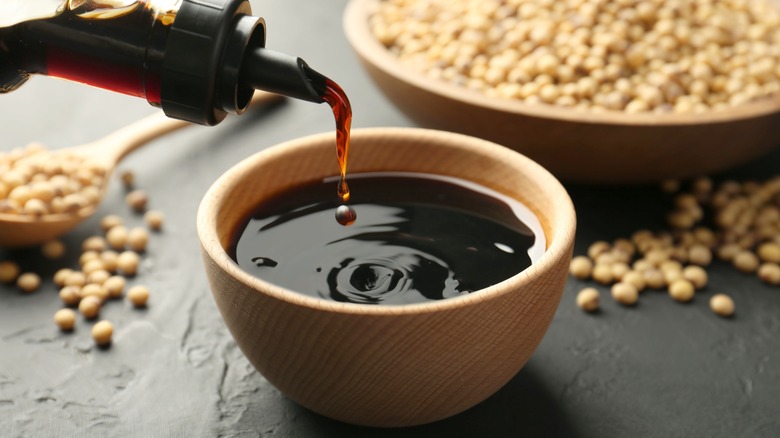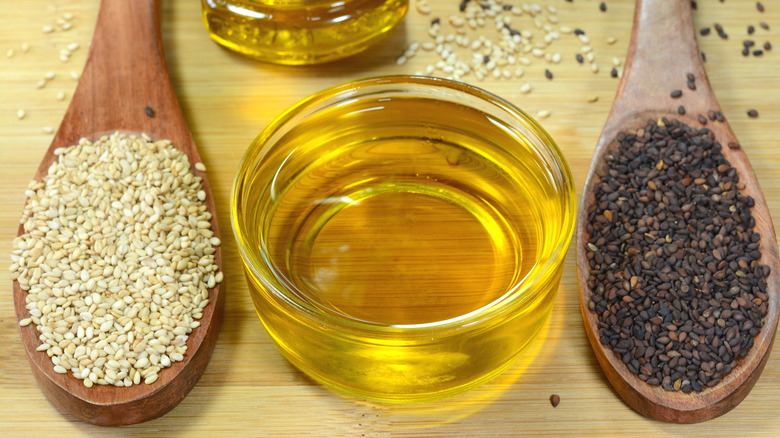10 Ways To Seriously Upgrade Your Steak Marinade
Some home chefs recommend keeping steak seasoning simple with salt and pepper, others believe that a marinade can both tenderize meat and imbue it with additional flavor. Whether you're preparing a perfectly-marbled T-bone, a juicy tenderloin, or a tougher cut of beef like hanger steak, flank steak, or skirt steak, a top-notch marinade can take your beef to a whole new level. For optimal results, place the steak and marinade in a resealable plastic bag and gently massage the meat to evenly coat it in the marinade before letting it rest.
While you can use a meat tenderizer such as a stainless steel mallet to pound a tough cut of steak into submission, a well-prepared marinade offers a more sophisticated approach. This is because the acids and enzymes found in a marinade break down proteins in beef, making it more tender. Acids are normally found in ingredients such as lemon juice, vinegar, and yogurt while enzymes are commonly found in fruit. Aside from tenderizing it, marinades can also infuse steak with flavor. This is particularly true for marinades that include herbs, spices, and alcohol.
Ready to elevate your steak game to a brand new level? Check out our roundup of the best ways to upgrade your steak marinade.
1. Try mixing in different acids
Acid works by lowering the pH level of marinades, which helps to denature, or break down, the proteins in beef, thus tenderizing it. This change in structure of the meat can also increase its water-holding capacity and make it juicier. Some of the most popular acidic marinades incorporate ingredients such as lemon juice, buttermilk, and vinegar. Interestingly, tomato paste marinades for your steak can also provide the same natural acidic effect.
When it comes to acid-based marinades, there's a fine line between enhancing meat and ruining its texture and flavor. When used correctly, acids can help to turn steak into a juicy and tasty bite. However, when used incorrectly, they can affect the meat's flavor, and make it tough and mushy. K.C. Gulbro, the Chef Ambassador for Certified Angus Beef, recently explained this in an interview with Food Republic, saying, "It's important to strike a balance between the acid, oil, and flavor because too much acid [in a marinade] will make the meat bitter." Gulbro also recommends not marinating meat in an acid-based marinade for longer than three hours.
Static Media owns and operates Mashed and Food Republic.
2. Add a hint of sweetness
Adding a little sweetness to savory dishes can enhance their flavor profile and balance out any salty or acidic ingredients. The rich taste of natural sweeteners such as honey can also imbue marinades with depth and complexity. Besides adding subtle sweetness to your steak, infusing meat in a marinade with honey will help to keep it juicy and tender. This is because honey is hygroscopic due to its high sugar content, which means that it has the ability to absorb moisture from its surroundings. While not many realize this, honey is also mildly acidic, with a pH level of around 4, which can help to tenderize meat.
Another benefit of honey marinades is that they caramelize during cooking, browning your steak to perfection while creating a lovely crust. This caramelization can also introduce a depth of flavor that compliments steak's savory elements. This being said, it's advisable to exercise caution when searing steaks on high temperatures, since sweeteners such as honey, brown sugar, agave nectar, or molasses can burn quickly, leading to a bitter taste.
3. Amp up the steak marinade with fresh fruit
It turns out that fresh fruit doesn't just make a delicious snack, it can also add a burst of sweet and tangy flavor to your steak marinade. And the great news is that there are plenty of fruits to choose from, ensuring that you can tailor your marinade to suit your taste preferences. Some of the fruits that can be incorporated into marinades include pineapple, lemon juice, kiwi, papaya, mango, and even figs and tamarind — yes, both of these fall in the category of fruit. As a rule of thumb, if you want a milder fruit flavor, opt for less intense tasting fruits like papaya or kiwi.
The power of fruit goes beyond flavor. When mixed into a marinade, fruit can also tenderize your steak. This is because many fruits contain enzymes that naturally break down the protein in meat, softening cuts of beef and making them more succulent. Provided that you don't leave the steak in the marinade for too long, the enzymes in the fruit will tenderize the meat without changing the structure of its fibers and making it mushy.
4. Infuse the marinade with fresh herbs
Adding fresh herbs to a dish can elevate its flavor, aroma, and visual appeal. While incorporating fresh herbs into your steak marinade won't imbue it with an overwhelming intensity or change its final appearance, it can definitely enhance its overall taste profile. More specifically, marinating your steak in a mixture of fresh herbs, your favorite acidic and sweet ingredients, as well as a little salt and pepper, can round out its flavor, elevating the dish from decent to incredible.
So what herbs should you be adding to your steak marinade? Known for its robust and earthy flavor, rosemary is one of the most popular botanicals for enhancing the flavor of meat. The earthy and somewhat bitter notes of oregano also make it a perfect companion to steak. Another outstanding choice is freshly chopped up basil, a herb known for its sweet and mildly peppery flavor. Parsley is also a common addition to marinades since its clean and crispy taste can be used to balance their stronger flavors.
5. Marinate steak in yogurt
More than just a breakfast staple, yogurt is a culinary chameleon. This creamy dairy product makes a great addition to a lot of unexpected dishes, such as broccoli cheddar soup or Greek yogurt coleslaw. Interestingly, the mild acidity in yogurt can also be used to tenderize meat. To put things in perspective, yogurt has a pH of between 4.4 and 4.8 while for something much more acidic like vinegar, this number would hover between 2.40 and 3.40.
Since yogurt's acidity is so gentle, you don't need to worry as much about over-marinating your steak — a common mistake that can give it a mushy texture. In fact, you can leave the meat in a yogurt-based marinade for as long as 12 hours. In contrast, more acidic marinades should only be used for a few hours. For added flavor, mix the yogurt with herbs and spices such as garlic and cayenne pepper. As a final aside, when picking out your yogurt at the supermarket, be sure to opt for a plain, unstrained product. If you decide to use Greek yogurt, mix it with a little lemon juice to loosen its consistency and ensure even coverage.
6. Stir in a little alcohol
It may come as a surprise that alcohol was already being used to tenderize and add flavor to meat in China some 9,000 years ago. This ancient practice laid the foundation for the marinating techniques that are still in use today to break down the proteins in the meat and make it nice and juicy. In addition, since alcohol binds to both water and fat molecules, the fattier the cut of beef, the more it will soak up the marinade's flavor.
Marinades with different alcohol types can imbue steak with distinct flavors. For instance, beer can add a characteristic malty taste to your T-bone or porterhouse. Marinating steak in whiskey, on the other hand, will give it rich, smoky notes and a distinct depth of flavor. Meanwhile, marinating meat with a little rum can imbue it with a touch of sweetness. The alcohol in marinades usually cooks off fairly quickly when the steak is seared. Nevertheless, if the liquor doesn't evaporate during the searing process, you can also flambé the steak to ensure that any remaining alcohol is burnt off.
7. Add a little zing with mustard
Mustard is an ultra-versatile condiment that's usually paired with sandwiches, burgers, and sausages. It's also commonly used in a variety of dishes such as deviled eggs and beef Wellington. Regardless of the plate, many chefs choose to complement it with Dijon mustard due to its sharp and complex taste profile. It's precisely this flavor intensity that makes Dijon mustard perfect for marinades. Conversely, those who prefer their steak with a milder mustard flavor can opt for yellow mustard.
When it comes to mustard marinades, the possibilities are nearly endless. This is because the zesty, and mildly acidic, flavor of mustard not only tenderizes the meat but also pairs exceptionally well with a huge range of ingredients. Tasting Table recommends a steak marinade that combines Dijon mustard with a little sriracha sauce. Since Dijon mustard hails from a town of the same name in Burgundy, you may wish to add a little French flair to your marinade by mixing it with champagne vinegar and some rosemary.
Static Media owns and operates Mashed and Tasting Table.
8. Throw some umami flavor into the mix
Umami is the fifth basic taste, alongside sour, sweet, bitter, and salty. Also known as monosodium glutamate, umami was first discovered in Japan in 1908 when Dr. Kikunae Ikeda became curious about the distinctive savory flavor of his bowl of kelp broth. Umami, which translates to "delicious savory taste" in Japanese, is often described as savory and meaty — both flavors that make perfect additions to steak marinades.
Some of the foods that are rich in umami include tomatoes, cheese, seaweed, kimchi, mushrooms, meat, fish, and soy sauce. While not all of these may be suitable for your steak marinade, some can definitely enhance its flavor. Two umami-rich ingredients that work well in marinades are soy sauce and Worcestershire sauce. Alternatively, you can opt to infuse your marinade with umami-heavy fermented sauces, such as fish sauce or miso paste. If all else fails, you can also throw a pinch of MSG, or monosodium glutamate, into the mix as this seasoning can amplify the umami flavor of a marinade without overpowering the steak.
9. Use freshly-ground spices
Adding spices to a steak marinade can add an element of complexity to the natural flavor of beef. If you opt to go down this culinary path, it's best to purchase whole spices whenever possible and grind them at home instead of using ready-made seasoning. This is because as soon as they're ground, spices start to lose their flavor and aroma due to exposure to light and air. If you don't have a spice grinder or a mortar and pestle, you can easily grind your spices in an electric coffee bean grinder.
Since pretty much any spice can work in a marinade, this is your opportunity to get creative. Although they can be crucial to a successful marinade, don't just stop at ground peppercorns. Other spices that can be purchased whole and ground at home include cloves, nutmeg, caraway seeds, fennel seeds, cumin, and cayenne pepper. Of course, if you can't find these spices whole, you can always use the pre-ground versions commonly found at grocery stores.
10. Keep the steak juicy with oil
According to some chefs, oil is an essential building block of a well-balanced marinade. This is because fat helps carry the flavors of the other ingredients in the marinade, including spices and herbs. Additionally, oil is relatively thick, which helps to achieve an even coating around the steak. This, in turn, can promote more uniform cooking. For best results, chop the herbs finely and press the garlic before mixing them with the oil. It's best to do this before adding any other liquids to the marinade.
For a neutral oil flavor that doesn't interfere with the marinade's other ingredients, it's best to opt for mild-tasting oils like grapeseed or canola. Those who don't mind a more pronounced oil flavor in their marinade can go with a richer tasting oil such as olive oil or sesame oil. For a creative twist, consider making your own infused oil by combining it with herbs and spices like thyme and chili peppers. In terms of quantity, some home chefs like to add a lot of oil to their marinade, recommending that it should be at least half oil, while others are adamant that a few tablespoons of oil per cup of marinade should be enough.
